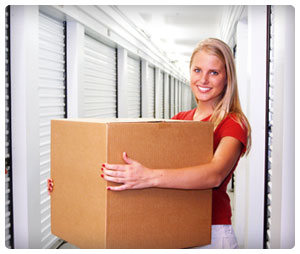Self-Storage Units
Do you need somewhere else to put your stuff?
If you don’t want to get rid of your extra stuff, it’s time to find a storage unit. Storage units are lockable spaces that you rent from a public storage facility, usually on a monthly basis.
Storage unit prices vary by size, location and amenities, like climate control. When looking for a storage unit, here are the things to consider:
Different Types of Self Storage Units
- Storage Unit Terms – You might hear about mini storage, business storage, public storage, and even lockable storage. Guess what? They’re all pretty much the same thing.
- Sizes – The most common storage unit sizes are 5×5, 5×10, 10×10, 10×15, 10×20, 15×20, and 20×20 (all square feet). See our chart for what size storage unit you need.
- Drive Up Storage Units – Some public storage places have all ground-level units. You can just drive right up and unload. However, in densely packed urban areas, many storage facilities are multi-story buildings that require renters to use a freight elevator. If the convenience of drive-up access is important to you, make sure you look for a ground-level unit with car access.
- Climate-Controlled Storage Units – Many facilities offer climate-controlled units to protect your stuff from humidity, heat and cold. If your storage unit is in an area that’s prone to high humidity or extreme temperatures, or if you’re storing delicate things like photographs or electronics, you should get climate control.
- Storage Locks – Some storage units come with locks built in. Other facilities require you to buy a lock for your storage unit (get a disc lock).
How to Find a Good Self Storage Facility
There are dozens of storage facilities in any city. You can find them in the yellow pages or online. Here’s how to compare them:
- Prices – Get an estimate with our storage cost calculator first. Then compare prices among the companies you find. Be sure to pay attention to any deals that a company offers and its amenities. Many will offer a free month’s rent or free carry-in assistance.
- Do a background check – Take the time to do your homework before settling on a storage facility. Read online reviews to see if other customers were satisfied with their experience. Also, don’t be afraid to visit the facility and ask to take a look at a few of the units yourself.
- Secure self storage – Some storage units offer better security than others. For example, some might have security guards, alarm systems, and hi-tech locks. Others might simply depend on a padlock you supply yourself.
- Do I need a moving truck? Some facilities have moving trucks and vans available for rent. A few will even lend you their truck for free. If you have to bring your own truck, make sure it will fit through the facility’s gate.
How to Load a Storage Unit
Don’t just start piling stuff into your storage unit, unless you want to have a terrible time getting it out. To make your life easier in a few months, you should have a plan for organizing your possessions. Here are some tips:
- Break down large pieces of furniture to save on space. Be sure to keep all hardware taped to the piece in a resealable plastic bag. Label the bag (e.g. “hardware for dining room table”) in case of accidental separation.
- Wrap furniture in moving blankets to prevent nicks and dents when shuffling items around.
- Label all of your boxes and be as detailed as you can. You may think you’ll remember where you put everything, but six months later, when you’re rifling through every box in search of a power cord, you’ll wish you had labeled.
- Leave a walkway down the middle of your unit to maximize access to things stored in the back.
How to Storing a Vehicle
- Cars, motorcycles, and boats require special storage facilities – Search specifically for vehicle storage when you need a place to put up your car. If you want to protect your car from the elements and be sure that it’s safe from vandalism and theft, choose a facility that specializes in indoor vehicle storage. These places generally offer greater security than outdoor parking lots, as well as an electrical hookup in case your battery needs a charge when you return.
Next Step: Getting Rid of Unwanted Stuff
Other Self-Storage Articles:
Estimate your self storage costs
What size storage unit do I need?
How do I lock my storage unit?



